In mid-October, the Louisiana Fair Housing Action Center, with our partner Jane Place Neighborhood Sustainability Initiative, hosted housing justice forums for mayoral and city council candidates. We asked candidates in each race tough questions on how they plan to address New Orleans’ ever growing fair and affordable housing needs. To help you navigate their responses and weigh their policy ideas before you vote, we’ve created this guide. For each race, we’ve included the questions we asked, a link to the video of candidates’ answers, , and a start time for each question. In addition, we’ve provided you with LaFHAC’s answers to the question, so you can see what we think is the best way for our elected officials to act on these pressing issues.Early voting starts Saturday, October 30th and runs through Saturday, November 6th (excluding Sunday, October 31st). Election Day is Saturday, November 13th. Double check your registration, view a sample ballot, and confirm your polling location at the Secretary of State’s Voter Portal. Some polling locations have changed due to Hurricane Ida.

Candidates Present: Belden Batiste, Luke Fontana, Leilani Heno and Johnese Lamar Smith
Candidates Absent: Joseph Amato, Eldon Delloyd Anderson, Douglas Bentley I, Manuel Bruno, LaToya Cantrell, Byron Stephan Cole, Matthew Hill, Nathaniel Jones, Reginald Merchant, Vina Nguyen
Video starts at 8:30
Opening Statements (9:10)
Question 1: After Hurricane Ida, renters looking for a new home are now seeing rents $200-$500 more than they were in August due to a shortage of available units. Meanwhile, there are still 6,500 homes listed on Airbnb in New Orleans and the vast majority of them are unpermitted. We spent three years writing new regulations, but the City has failed to enforce them and only de-listed 267 unpermitted units. How would you better enforce our existing ordinance and/or what changes would you make to the ordinance?
See the candidates’ answers at 14:26.
LaFHAC’s answer:
Question 2: In December, voters will have the opportunity to continue two millages, one for the library and the other for the Neighborhood Housing Improvement Fund (NHIF). The NHIF brings in $3 to $4 million per year, and it has regularly been used to make up gap funding for new affordable housing developments, to finance home repairs for low-income elderly and disabled homeowners, to offer first-time homebuyer assistance, and to meet the needs of our unhoused population. Will you ask your supporters to vote for the NHIF in December, and what other creative solutions do you have to raising money for affordable housing? See the candidates’ answers at 20:38.
LaFHAC’s answer:
Question 3: The 1968 Fair Housing Act requires cities and states to actively dismantle segregation and in 2016, New Orleans became the first city to submit a plan to do that under an Obama-era rule called the Affirmatively Furthering Fair Housing rule. It’s been five years and it’s time for us to submit a new plan. What would be your priorities to address segregation in our new fair housing plan?
See the candidates’ answers at 27:58.
LaFHAC’s answer:
Closing Statements (34:25)

Candidates Present: Kenneth Cutno
Candidates Absent: Helena Moreno
Video starts at 2:07:02
Opening Statement (2:07:50)
Question 1: New Orleanians have little confidence left in Entergy. In-depth reporting has shown that the company has avoided investing in making its poles, lines, and towers more resilient for years. What will it take to ensure Entergy is more accountable to its ratepayers than to its shareholders?
See the candidate’s answer at 2:09:28.
LaFHAC’s answer:
Question 2: Though New Orleans has delivered more rental assistance than most jurisdictions, thousands of renters are still waiting for help. To make matters worse, eviction protections expired last month and anyone who loses their home now faces a rental market where units are $200-$500 more a month than before Hurricane Ida. Do you believe anyone at risk of losing their home in eviction court should have access to an attorney? And if so, how would you fund the $2 million cost of a program like that?
See the candidate’s answer at 2:10:46.
LaFHAC’s answer:
Question 3: The American Housing Survey shows we have tens of thousands of rental units with leaks, mold, rats, and other hazards. But 2019 data from the Office of Code Enforcement shows only a little over 100 complaints related to interior violations at rental properties. The discrepancy suggests that renters are afraid to report health and safety violations, and they’d be right to be fearful as we are one of only seven states that don’t protect renters from retaliation. Would you support an ordinance that protects renters from retaliation when they attempt to report a violation? And how would you respond to landlords who say it would hinder their business?
See the candidate’s answer at 2:21:26.
LaFHAC’s answer:
Closing Statement (2:14:54)
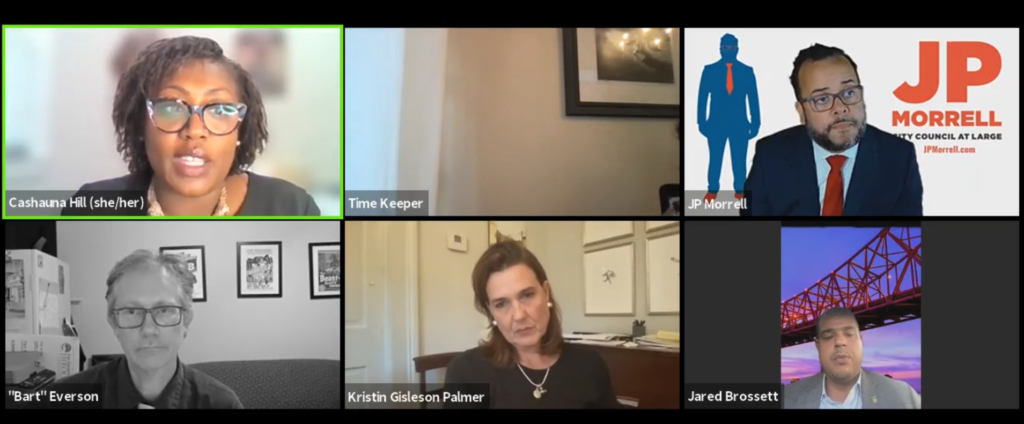
Candidates Present: Jared Brossett, Bart Everson, Kristin Gisleson Palmer, JP Morrell
Video starts at 12:10
Opening Statements (12:33)
Question 1: LaFHAC just released a report documenting how neighborhood association boards tend to be whiter and more affluent than the areas they claim to represent, and how they have used their significant influence to delay or kill over 600 units of affordable housing since Hurricane Katrina. Why should voters trust you to stand up to Not In My Back Yard (NIMBY) opponents of affordable housing?
See the candidates’ answers at 18:55.
LaFHAC’s answer:
Question 2: Will fines ever be enough to hold a privately owned utility company like Entergy accountable? What sort of action do you believe the Council needs to take to ensure ratepayers have access to sustainable, reliable, and affordable energy?
See the candidates’ answers at 27:08.
LaFHAC’s answer:
Question 3: After Hurricane Ida, The Lens documented the story of a woman who requested repairs to her leaky ceiling for over a year. The landlord did nothing and her ceiling collapsed during the storm, ruining most of her belongings and leaving her with nowhere to live. Even on a good day, our code enforcement system is broken and renters face retaliation when they report violations. How would you ensure rental homes meet basic health and safety standards?
See the candidates’ answers at 35:16.
LaFHAC’s answer:
Closing Statements (42:11)

Candidates Present: Bob Murrell
Candidates Absent: Joe Giarrusso, Amy Misko
Video starts at 40:46
Opening Statement (42:15)
Question 1: There has been a lot of concern in the University area over developers buying up homes and expanding the number of bedrooms in order to rent them to students. Neighbors call these “Doubles to Dorms” a nuisance that hinder their quality of life, make parking harder, and increase rents. Housing advocates have suggested that the initial solution proposed by Councilmember Giarrusso to require additional parking spaces for newly added bedrooms will also increase rents, exacerbate flooding, and may not deter the developers. How would you solve this problem?
See the candidate’s answer at 43:31.
LaFHAC’s answer:
Question 2: More cities and states are doing away with single-family zoning, noting that it originated as an effort to keep cities segregated. Do you believe anyone in New Orleans who owns a single or a double should be able to build a third unit on their property? And if so, do you believe increasing the supply of housing alone would make District A more affordable to hospitality and other service workers?
See the candidate’s answer at 45:48.
LaFHAC’s answer:
Question 3: District A has high-performing schools, great parks, and universities and a hospital that act as job centers, but much of it is unaffordable to the average New Orleanian. What will you do to create more affordable housing in the district so that all residents can share in the resources District A has to offer?
See the candidate’s answer at 47:35.
LaFHAC’s answer:
Closing statement (50:17)
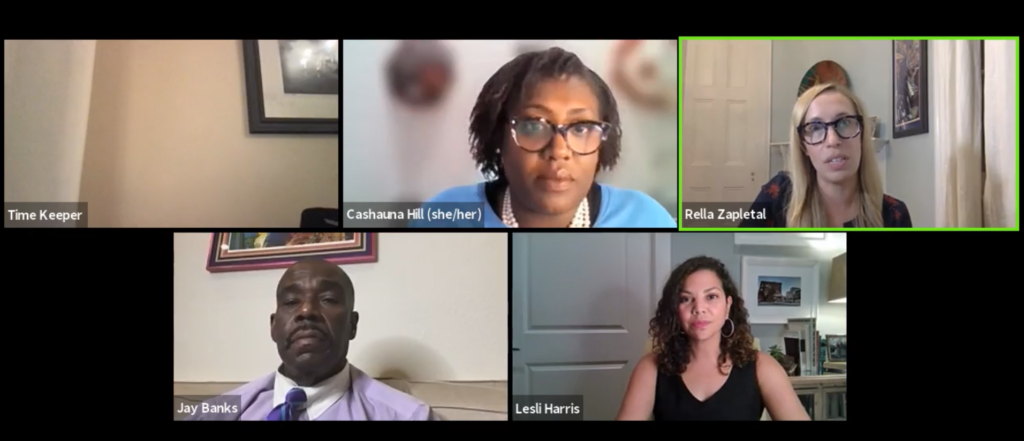
Candidates Present: Jay H. Banks, Lesli Harris, Rella Zapletal
Candidates Absent: Rosalind Reed-Thibodeaux
Video starts at 51:37
Opening statements (53:30)
Question 1: This summer, neighbors flooded an online community meeting about a proposed affordable housing development in the Touro neighborhood with racially coded opposition. They suggested that residents of the development, which would be disproportionately Black seniors, would need extra security checks, would be a “tax on the neighborhood,” and would attract crime. Opponents of a senior building proposed for Baronne St. made similar arguments last year and succeeded in getting a proviso included in the zoning change that will require 24-hour surveillance cameras at the building, connected to the Real Time Crime Center. LaFHAC just released a report last week documenting how primarily white-led neighborhood associations consistently work to delay affordable housing developments to death and have delayed or denied over 600 affordable units since Hurricane Katrina. Why should voters trust you to stand up to Not In My Back Yard (NIMBY) opponents of affordable housing?
See the candidates’ answers at 57:12.
LaFHAC’s answer:
Question 2: After Hurricane Ida, the local news captured multiple instances of renters who had reported health and safety violations to their landlords for months before the storm. Renters at the Saulet and in dozens of other locations said their landlords did nothing, but when Ida exacerbated the problems, the landlords tried to evict them. How would you ensure rental homes meet basic health and safety standards and protect renters from retaliation?
See the candidates’ answers at 1:03:35.
LaFHAC’s answer:
Question 3: District B includes most of the larger encampments for unhoused individuals in New Orleans. The City has focused a lot of resources on sweeps that shuffle people around and remove their property, but don’t solve the problem. We’ve also heavily invested in shelters, even though most unhoused people have no interest in shelters, because they’ve had negative and sometimes violent experiences there. What will you do to advocate for long-term housing solutions for people experiencing homelessness?
See the candidates’ answers at 1:09:17.
LaFHAC’s answer:
Closing Statements (1:14:39)
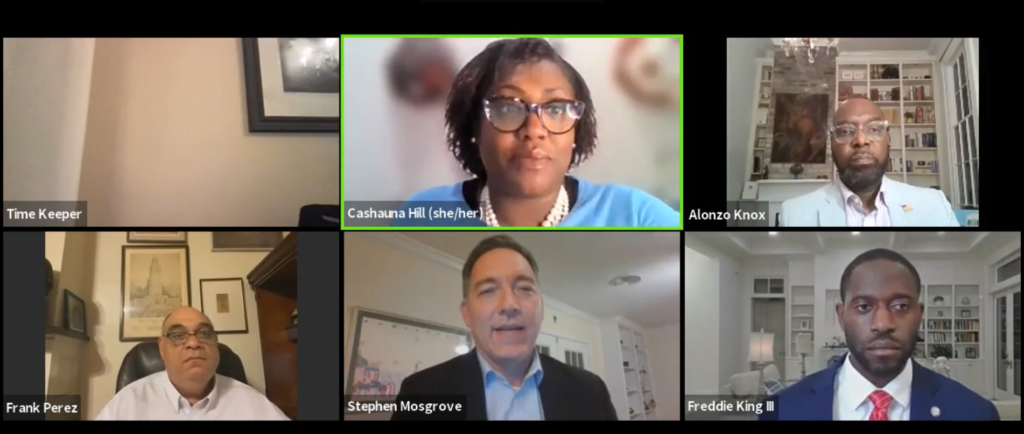
Candidates Present: Freddie King III, Alonzo Knox, Stephen Mosgrove, and Frank Perez
Candidates Absent: Stephanie Bridges, Vincent Milligan Jr., Barbara Waiters
Video starts at 1:18:55
Opening Statements (1:20:44)
Question 1: Though New Orleans has delivered more rental assistance than most jurisdictions, thousands of renters are still waiting for help. To make matters worse, eviction protections expired last month and anyone who loses their home now faces a rental market where units are $200 to $500 more a month than before Hurricane Ida. Do you believe anyone at risk of losing their home in eviction court should have access to an attorney? And if so, how would you fund the $2 million cost of a program like that?
See the candidates’ answers at 1:26:53.
LaFHAC’s answer:
Question 2: Do you trust Peter Bowen, the former short-term rental executive, who now runs the City’s Office of Business and External Services to enforce our short-term rental laws? What would you do as a Councilmember to hold the City accountable for enforcing its own rules?
See the candidates’ answers at 1:32:38.
LaFHAC’s answer:
Question 3: Some historic preservationist groups defended our Confederate monuments and have been at the center of opposition to new affordable housing in the Bywater and elsewhere in the city. As our new report shows, they have often aligned themselves with white-led neighborhood associations and attempted to delay new development to death. How do you intend to preserve communities and the people who live in them, not just buildings?
See the candidates’ answers at 1:40:04.
LaFHAC’s answer:
Closing Statements (1:48:00)
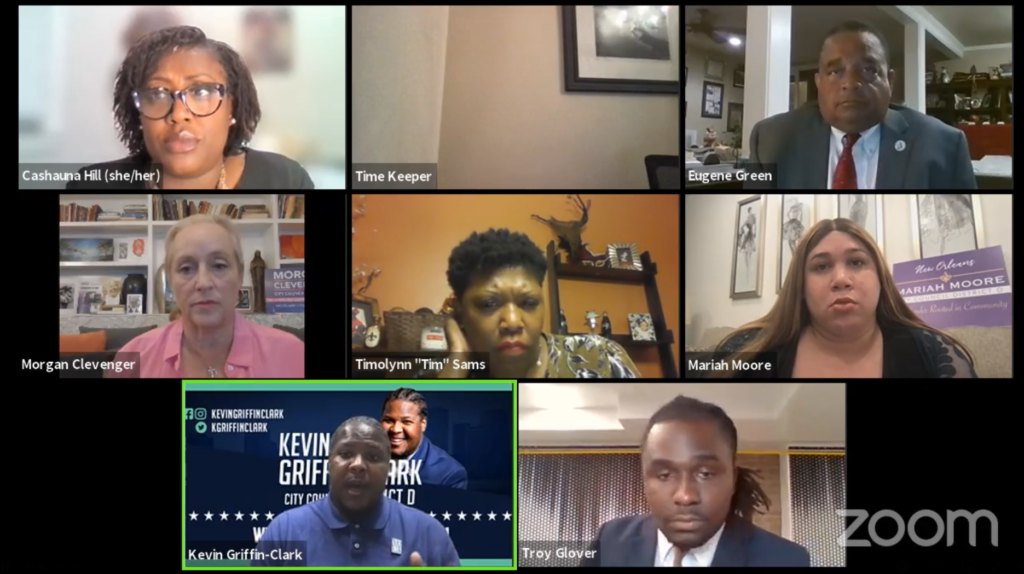
Candidates Present: Morgan Clevenger, Troy Glover, Eugene Green, Kevin Griffin-Clark, Mariah Moore, Timolynn Sams
Candidates Absent: Chelsea Ardoin, Chantrisse Burnett, Anthony Doby, Mark Lawes, Robert Murray, Keith Parker, Dulaine Troy Vining, Kourtney Youngblood
Video starts at 48:10
Opening Statements (50:21)
Question 1: New Orleans is a majority renter city with thousands of rental units in disrepair and almost no enforcement. When renters in Louisiana do report health and safety violations, they’re often evicted in retaliation. In nearly every other state, including Texas and Georgia, landlords who try to evict within six months of a renter reporting a violation are assumed to be retaliating unless they can prove the eviction is for a valid lease violation. Would you support an anti-retaliation ordinance like this? What other protections do you believe renters deserve?
See the candidates’ answers at 57:11.
LaFHAC’s answer:
Question 2: There is a vast body of social science research showing that when families have access to safe, affordable homes in neighborhoods with jobs, good schools, and other amenities, they have immensely better outcomes. That includes better mental and physical health outcomes, as well as children doing better in school, and even children who earn more when they become adults. There is far less research showing that increasing law enforcement creates better outcomes for kids, especially Black and Brown children. Yet, more than one-third of our City’s general fund goes towards law enforcement, but none of it is spent on housing. How would you address this disparity?
See the candidates’ answers at 1:08:57.
LaFHAC’s answer:
Question 3: LaFHAC just released a report documenting how neighborhood association boards tend to be whiter and have more homeowners than the areas they claim to represent. Despite that fact, Councilmembers have historically deferred to, and referred to, them as the “voice of the neighborhood,” especially in land-use and zoning disputes. Many of you have been involved with or run neighborhood associations. How would you change our neighborhood engagement system to ensure that our majority-renter, majority-working class, majority-Black residents are accurately represented in zoning and land-use decisions?
See the candidates’ answers at 1:22:40.
LaFHAC’s answer:
Closing statements (1:36:21)
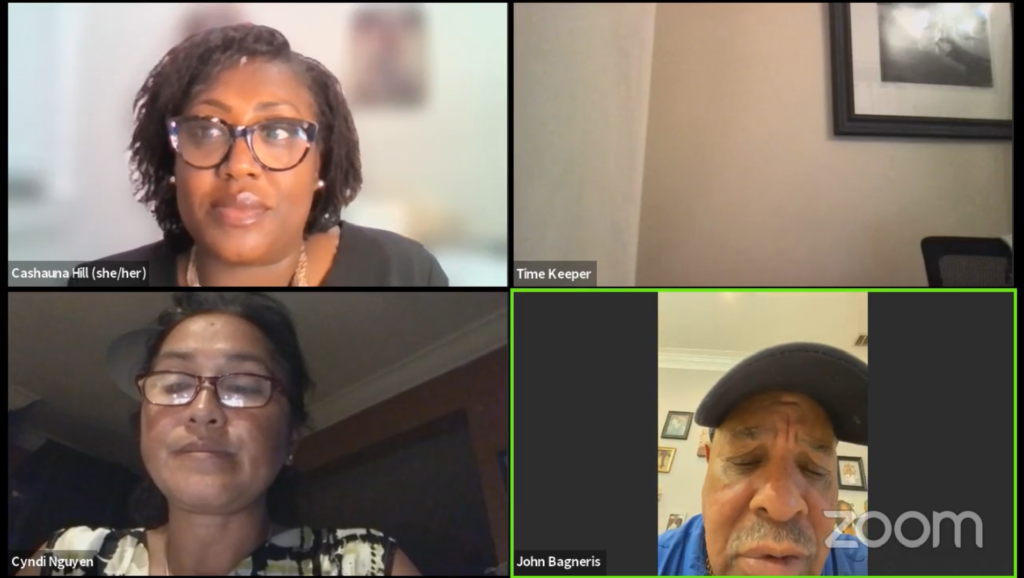
Candidate Present: John Bagneris, Cyndi Nguyen
Candidates Absent: Michon Copeline, Vanessa Johnson, Aaron Miller, Oliver M. Thomas
Video starts at 1:45:26
Opening Statements (1:47:42)
Question 1: New Orleans East and the Lower 9th Ward have historically had higher rates of homeownership, but the district is currently 47% renters. One might argue that the best way to increase homeownership rates is to ensure safety and stability for renters who might want to eventually become homeowners. What is your top policy priority to protect the tens of thousands of renters who live in District E?
See the candidates’ answers at 1:50:49.
LaFHAC’s answer:
Question 2: Some of the most notorious slumlords in the city operate buildings in New Orleans East. They make few repairs in buildings with leaking sewage, mold, and other safety hazards, but they always collect the rent, and they are responsible for a disproportionate number of evictions. Do you believe they should be subject to regular health and safety inspections, like restaurants? Why or why not?
See the candidates’ answers at 1:54:44.
LaFHAC’s answer:
Question 3: This spring, The Times-Picayune ran an article asking why New Orleans East still lacks retail and dining establishments. It hinted at the racism inherent in the real estate market when it noted that developers and national chains lost interest in the area as white people left. The same can be said for the Lower 9th Ward. Understanding that racism is unlikely to change quickly, what are the most important investments the City can make to catalyze development in these two areas?
See the candidates’ answers at 1:59:20.
LaFHAC’s answer:
Closing Statements (2:03:57)